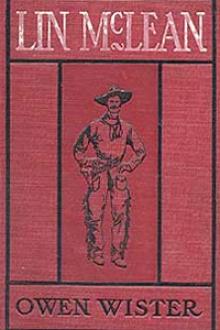The Virginian: A Horseman of the Plains, Owen Wister [best e books to read txt] 📗

- Author: Owen Wister
Book online «The Virginian: A Horseman of the Plains, Owen Wister [best e books to read txt] 📗». Author Owen Wister
“Think of her,” muttered McLean.
“Who else would I be thinking of?” returned the Southerner. His face had become very sombre. “She has been raised so different!” he murmured. He pondered a little, while the others waited, solicitous.
A new idea came to the proprietor. “I am acting mayor of this town,” said he. “I'll put him in the calaboose and keep him till you get married and away.”
“Say the word,” repeated Honey Wiggin.
Scipio's eye met the proprietor's, and he shook his head about a quarter of an inch. The proprietor shook his to the same amount. They understood each other. It had come to that point where there was no way out, save only the ancient, eternal way between man and man. It is only the great mediocrity that goes to law in these personal matters.
“So he has talked about me some?” said the Virginian.
“It's the whiskey,” Scipio explained.
“I expect,” said McLean, “he'd run a mile if he was in a state to appreciate his insinuations.”
“Which we are careful not to mention to yu',” said Wiggin, “unless yu' inquire for 'em.”
Some of the fools present had drawn closer to hear this interesting conversation. In gatherings of more than six there will generally be at least one fool; and this company must have numbered twenty men.
“This country knows well enough,” said one fool, who hungered to be important, “that you don't brand no calves that ain't your own.”
The saturnine Virginian looked at him. “Thank yu',” said he, gravely, “for your indorsement of my character.” The fool felt flattered. The Virginian turned to his friends. His hand slowly pushed his hat back, and he rubbed his black head in thought.
“Glad to see yu've got your gun with you,” continued the happy fool. “You know what Trampas claims about that affair of yours in the Tetons? He claims that if everything was known about the killing of Shorty—”
“Take one on the house,” suggested the proprietor to him, amiably. “Your news will be fresher.” And he pushed him the bottle. The fool felt less important.
“This talk had went the rounds before it got to us,” said Scipio, “or we'd have headed it off. He has got friends in town.”
Perplexity knotted the Virginian's brows. This community knew that a man had implied he was a thief and a murderer; it also knew that he knew it. But the case was one of peculiar circumstances, assuredly. Could he avoid meeting the man? Soon the stage would be starting south for the railroad. He had already to-day proposed to his sweetheart that they should take it. Could he for her sake leave unanswered a talking enemy upon the field? His own ears had not heard the enemy.
Into these reflections the fool stepped once more. “Of course this country don't believe Trampas,” said he. “This country—”
But he contributed no further thoughts. From somewhere in the rear of the building, where it opened upon the tin cans and the hinder purlieus of the town, came a movement, and Trampas was among them, courageous with whiskey.
All the fools now made themselves conspicuous. One lay on the floor, knocked there by the Virginian, whose arm he had attempted to hold. Others struggled with Trampas, and his bullet smashed the ceiling before they could drag the pistol from him. “There now! there now!” they interposed; “you don't want to talk like that,” for he was pouring out a tide of hate and vilification. Yet the Virginian stood quiet by the bar, and many an eye of astonishment was turned upon him. “I'd not stand half that language,” some muttered to each other. Still the Virginian waited quietly, while the fools reasoned with Trampas. But no earthly foot can step between a man and his destiny. Trampas broke suddenly free.
“Your friends have saved your life,” he rang out, with obscene epithets. “I'll give you till sundown to leave town.”
There was total silence instantly.
“Trampas,” spoke the Virginian, “I don't want trouble with you.”
“He never has wanted it,” Trampas sneered to the bystanders. “He has been dodging it five years. But I've got him coralled.”
Some of the Trampas faction smiled.
“Trampas,” said the Virginian again, “are yu' sure yu' really mean that?”
The whiskey bottle flew through the air, hurled by Trampas, and crashed through the saloon window behind the Virginian.
“That was surplusage, Trampas,” said he, “if yu' mean the other.”
“Get out by sundown, that's all,” said Trampas. And wheeling, he went out of the saloon by the rear, as he had entered.
“Gentlemen,” said the Virginian, “I know you will all oblige me.”
“Sure!” exclaimed the proprietor, heartily, “We'll see that everybody lets this thing alone.”
The Virginian gave a general nod to the company, and walked out into the street.
“It's a turruble shame,” sighed Scipio, “that he couldn't have postponed it.”
The Virginian walked in the open air with thoughts disturbed. “I am of two minds about one thing,” he said to himself uneasily.
Gossip ran in advance of him; but as he came by, the talk fell away until he had passed. Then they looked after him, and their words again rose audibly. Thus everywhere a little eddy of silence accompanied his steps.
“It don't trouble him much,” one said, having read nothing in the Virginian's face.
“It may trouble his girl some,” said another.
“She'll not know,” said a third, “until it's over.”
“He'll not tell her?”
“I wouldn't. It's no woman's business.”
“Maybe that's so. Well, it would have suited me to have Trampas die sooner.”
“How would it suit you to have him live longer?” inquired a member of the opposite faction, suspected of being himself a cattle thief.
“I could answer your question, if I had other folks' calves I wanted to brand.” This raised both a laugh and a silence.
Thus the town talked, filling in the time before sunset.
The Virginian, still walking aloof in the open air, paused at the edge of the town. “I'd sooner have a sickness than be undecided this way,” he said, and he looked up and down. Then a grim smile came at his own expense. “I reckon it would make me sick—but there's not time.”
Over there in the hotel sat his sweetheart alone, away from her mother, her friends, her home, waiting his return, knowing nothing. He looked into the west. Between the sun and the bright ridges of the mountains was still





Comments (0)